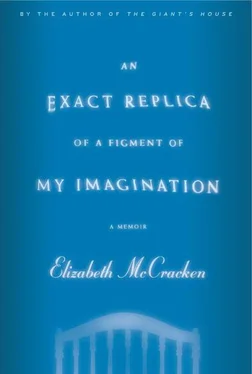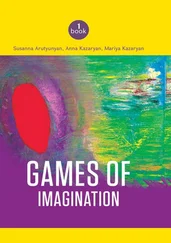The twins stood in when we learned about older children.
“Here’s where you press,” the instructor said, indicating the spot on the littler twin. He had blond ringlets and a potbelly.
“And then they throw up!” he said.
“Yes, sometimes,” she said.
“And then they eat it!”
“That doesn’t happen,” his mother said, frowning.
“Who wants to save me?” the taller twin asked the students politely, but we were all a little shy about rescuing a perfectly safe boy, right in sight of his mother.
I made sure I got my hands on one of the actual dummies, the kind with a balloon down its throat, whose chest rose when you blew into the mouth: I needed the physical reassurance. I put my hand across its torso. As long as I breathed, the dying plastic baby breathed. When I stopped, it stopped.
“Listen,” the woman announced suddenly, in the voice I recognized from fourth grade, a room full of kids working on projects, a teacher with a point: listen up, people. “Listen, children don’t die. They rarely die.”
She said this to calm us. If you think that children rarely die, then it’s easier to save them. I dandled the plastic baby on my knee and bit my lip.
My notes from that class say:
WORRY IN THIS ORDER
A
ir
B
reathing
C
irculation
And that of course is why we were taking all those courses: We wanted to be told, Worry in this order. We were delighted to know the damage a single loose almond in the cab of a car could do in the event of an accident, because then we could remove that almond and be vigilant about future dropped almonds. We wanted to hear all the details of a caesarean just in case; we wanted to know ahead of time how common vacuum-assisted births were. Once, we had belonged to the school of Cross That Bridge When We Come to It. Now we wanted all bridges mapped, the safety of their struts, their likelihood of washing out, their vulnerability to blackguards, angry natives, cougars.
Here is the worst thing that happened during my second pregnancy.
Edward had gone back to England for a month so that he could come back to America. I went to the doctor because I was worried about some minor pregnancy symptom. The ob-gyn was a nice bespectacled woman in her fifties, who I’d never seen before. Earlier in the pregnancy a different doctor had said, “Now, this is just about the time when you can hear a heartbeat,” and she’d put the monitor on my stomach and found nothing and we’d been rushed into the sonogram room, where all was well. Now, weeks later, the bespectacled doctor could not find a heartbeat.
At first that was fine. I lay back and let her feel around and remembered the earlier impossible-to-find heartbeat.
“There it is!” the bespectacled doctor said, and then “No, that’s you.” She took hold of my wrist to feel my pulse, slower than a baby’s. Every now and then we heard a thud thud through the monitor, and she’d pincer my wrist and shake her head: me again. I had a heartbeat.
After a while, I thought, Well. What if this is it? What do I do next? Call Edward in England, of course, but then what? Do I go home and get drunk? Drive like hell in the direction of my nearest good friend? Throw myself into the Hudson?
She said, “It’s no good. Now your heart is beating so fast, I won’t be able to tell the difference.”
I was rushed to the sonogram room. “Yup, there,” said the beautiful sonographer, nodding at the screen. Her name was Barb, and I loved her. The bespectacled doctor (who of course knew my history from my chart) put her hands on her head and walked in the several small circles of relief that Edward would have completed if he were there.
Poor woman. She’d been panicking as much as I had.
Perhaps it goes without saying that I believe in the geographic cure. Of course you can’t out-travel sadness. You will find it has smuggled itself along in your suitcase. It coats the camera lens, it flavors the local cuisine. In that different sunlight, it stands out, awkward, yours, honking in the brash vowels of your native tongue in otherwise quiet restaurants. You may even feel proud of its stubbornness as it follows you up the bell towers and monuments, as it pants in your ear while you take in the view. I travel not to get away from my troubles but to see how they look in front of famous buildings or on deserted beaches. I take them for walks. Sometimes I get them drunk. Back at home we generally understand each other better.
So at the end of February, when I was seven months pregnant, we took the train from Albany to New Orleans, where I’d been invited to give a reading. Saratoga Springs was still packed in graying snow, left over from a Valentine’s Day blizzard, and my pregnancy was no longer a secret from strangers, who cooed over my stomach, and said, “First child? You must be so excited!” We booked a tiny room with folding bunk beds for the train ride — the very definition of hell for some people, I know, but it was fantastic. Our across-the-corridor neighbor was an elderly English Franciscan monk and train buff, exactly the sort of person you can get to know only on a long train trip. We took all of our lousy, happy Amtrak meals with him.
In Tuscaloosa, at a pause, we stepped onto the platform and sniffed at the sunrise. We were riding into spring. This visit had originally been planned in the innocent April of 2005, for that October, when I would have been three months pregnant with Pudding. In Paris, just after the Gulf Coast’s calamity, I had to explain it to the beautiful woman in the Air France office near the Jardins du Luxembourg: New Orleans was under water. Everything was canceled. She smiled sympathetically but would not refund the ticket. The college asked me again for the spring of 2006, but I had to write back with my regrets: I planned to be heavily pregnant or giving birth for the entire spring.
What would it be like, postdiluvian us in postdiluvian New Orleans?
On our first full day our hostess took us on what she called the Devastation Tour of the city: the haunted Lower Ninth Ward, where one woman stood on the porch of the only renovated house for blocks, her moving van parked out front. We saw the house of the filmmaker Helen Hill, who’d been shot to death by an intruder while her husband scooped up their baby and ran to safety; we looked at some levees, which seemed to have been stapled back together and left to rust; we passed by other people on similar tours. Everywhere you could see protoplasmic high-water marks on houses, some low enough that you’d know that only the things in the basement were ruined, some so high you wondered how it was that the entire neighborhood had not been washed away. Other houses still had the international orange tattoos left after the storm: date searched; number of people saved; number of people who, being dead, were merely discovered. We ended up at the new Whole Foods near the studio apartment that had been rented for us, goggle-eyed at all that disorienting bounty. Who would need to buy, in such a world, a precooked vegan meatloaf?
“I don’t think they’re done finding bodies,” our hostess told us. She’d just gone on antianxiety medication so that she could bear living in the city she loved.
Spring had arrived just ahead of us, in the form of actual blossoms — magnolias — and the weird kudzu of flung-from-floats Mardi Gras beads in the trees. The city was all blue skies and light breezes and raw nerves and melancholy. Most everyone we met was on edge, some so heartsick we worried, even if we’d never met them before. They seemed frozen. Something had happened. It had been a year and a half, and if you weren’t in the middle of it you might lose patience: New Orleans, why can’t you get over it? We were very sorry for you for a while. Now there are other things to be sad about. It’s not your time anymore. Pull yourself together.
Читать дальше












